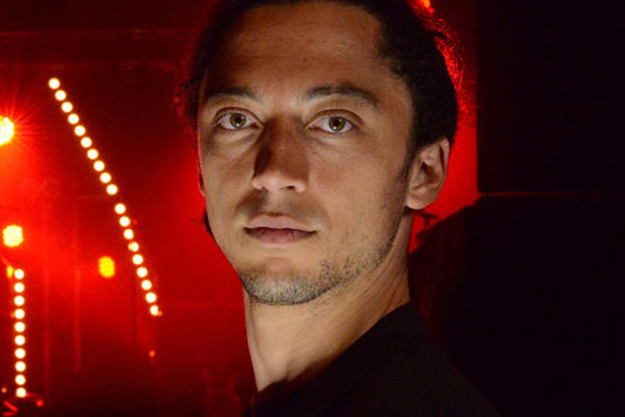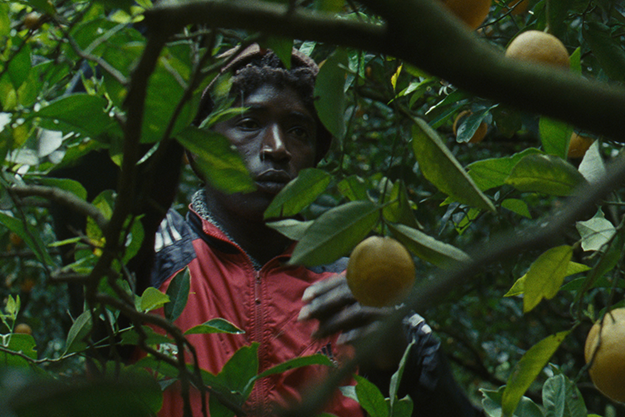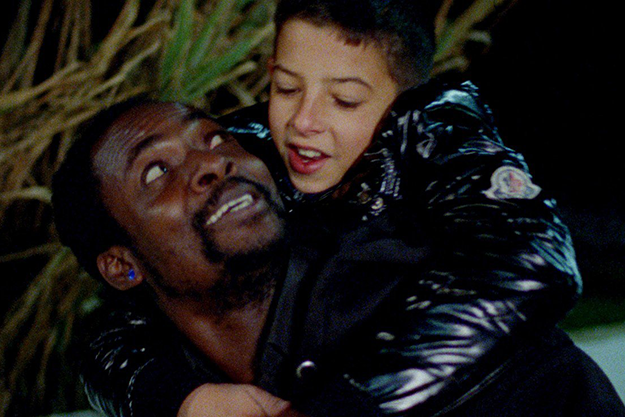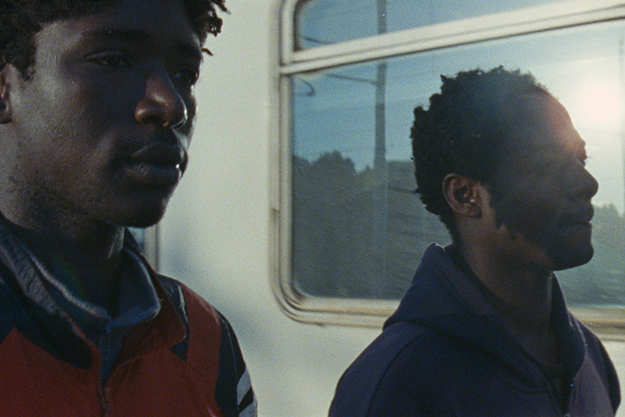Interview: Jonas Carpignano
By some measures, the arrival of thousands of Syrian refugees in Europe has rivaled any displacement on the Continent since World War II. These exiles follow a well-established stream of immigrants from Northern Africa, many of them known through heartbreaking headlines about perilous crossings of the Mediterranean that can end in abandonment and death. As illustrated by Mediterranea, Jonas Carpignano’s clear-eyed debut feature about a Burkina Faso migrant’s journey, making it to the other side only marks the beginning of a whole new set of economic, social, and cultural challenges.
For Ayiva—the Burkina Faso native who is the focus of the dynamically attentive camerawork—the endpoint of the journey is Calabria, Italy. Much of the trouble Ayiva faces getting a job and fitting in was actually experienced by the actor portraying him, Koudous Seihon. I wrote about the resulting drama in our July/August Hot Property: “With an intimate naturalism that at times evokes a tag-along documentary, Carpignano’s matter-of-fact approach, leavened with the humor of engaging side characters, produces the ring of truth without strain.”
In May at the Cannes Film Festival, I spoke with Carpignano, a proud product of the Bronx and Italy. The bright-eyed filmmaker discussed his debut feature shortly after its world premiere in Critics’ Week, where he’d won an award last year for his short A Ciambra. His new film, Mediterranea, opens November 20.

Jonas Carpignano, director of Mediterranea
Mediterranea is the result of years of hard work. How did you get these finely tuned performances from the cast? What was your philosophy going in?
The blessing of this film was what I thought stressed me about it—how long it took to make. I’ve been living down there for three and half years, and living with the lead actor, Ayiva Koudous. Everyone in this film is someone who is a part of our universe down there, part of our friend-group. So it was less about working with actors on a scene than taking things that happened to us in our lives and giving them enough of a dramatic purpose to fit in the film. Once we’d chosen the people, that process happened over the course of living there. It was just about getting people used to the camera, and being able to figure out how to shoot the scenes with enough freedom to allow them to move around without feeling like they had to stop to hit a light or something.
So the actors really lived through things that happen in the movie?
Yeah, the main character, Ayiva, did—the film is pretty much 90 percent based on experiences that happened to him.
And how far removed is he from those events? How long ago was that?
Some of it happened to us right before we shot them. For example, the fight scene in the alley. We’d gotten into a similar fight outside of an alley two years before, but then a few days before shooting that scene, something exactly like that happened. Some of the experiences we can take a step back and reflect on… but they’re still very actual in the sense that they are things that can still happen now.
Is it hard to tell a story that is so fresh? Was there a therapeutic aspect to doing it?
We really try to create a sense that it is not about me making a film about them, but rather it is us telling the story together. And that is the way I go at it, with Koudous especially but pretty much with everyone we involve. Everyone feels very much like a part of the process. I think that can make it more therapeutic because we feel like we are collaborating, bringing in something together.
The one place where we ran into trouble with that is when we were out shooting on the sea. Even though people were very committed to making sure we told that part of the story, and to getting it right, that triggered some things in some people that were unexpected. When we started with a boat with some 55 to 60 people on it, by the end we had half of that. Numerous people weren’t prepared for the emotions that it would bring back up, being out on sea. And when you are shooting things out at sea, you don’t feel the security that you get when you are just in a room.

Mediterranea
Those scenes are nerve-wracking. They make one hope everyone survived the shoot. On land, where were you filming mostly?
It’s the plain of Gioia Tauro and Rosarno. The two towns make up one essentially. We lived in Gioia Tauro and worked between Gioia Tauro and Rosarno.
How does it feel now to be showing your movie here in Cannes for its debut platform?
It’s pretty crazy. We hope the movie will get out into the world, but there’s something about making a film in your backyard, that then comes to this grand place—it feels so surreal.
You grew up in the U.S.?
Yeah, my mother is from New York.
What part of New York?
We grew up in the Bronx, East 216th, and then she moved to Manhattan.
And then how many years did you spend in Italy after New York?
It’s hard to break it down quite like that. I always went to school in America, but all of my family was always in Italy. It would be for the school months in New York, in the Bronx. And all my Christmases, all my summers were always in Italy, because that is where our family is and that is where we gather most of the time. On any given year, it’s a 60/40 split. Over the past 10 years I probably spent more time in Italy then I did in America.
It’s interesting having that split perspective. Thinking about the film, and the racist reactions Ayiva gets, I can’t help but compare between the U.S. and Italy and their respective challenges. How are the attitudes different in the two countries?
I think the fundamental difference is that, in Italy, this is a very new phenomenon. The immigration, but also the heavy African or black presence in Italy, is not as ingrained in the history of Italy as it is ingrained in the history of the United States of America. We have many generations of black people in America, of Americans. They’re not Africans. In Italy, they are still very much African. There are very few blacks, especially in the South, black Italians. I think that is what differentiates the discourse entirely. In America, it’s about coming to terms with, tolerating, and getting over prejudices that have existed for years and years. In Italy, it is more like making sense of the situation that no one is equipped to handle.

Mediterranea
One rich perspective in that sense belongs to the children. You’re very intent on including their viewpoints in the movie, and they’re such memorable characters: the wheeler-dealer boy who selling phones, or Marta, the daughter of the citrus farm manager.
It’s something I see happening in Italy: the more exposure the younger generation has to the presence of African immigrants, the quicker the situation alleviates itself. When we first met that girl who plays Marta, for example, we were all out for dinner, we were all sitting around, it was a friend’s birthday. You know, we were drinking, it was the summertime. At a certain point I look over, I don’t see Koudous anymore, and I’m like, where the hell did he go? An hour passes, and I still don’t know where he is. So I get up to look for him in this restaurant, and he’s inside, playing on the iPhone with that little girl, singing karaoke, and she’s asking all these questions about Africa. They just hit it off. Her curiosity about him gave it a special bizarre relationship, and they hit it off immediately. Luckily, her parents were pretty cool, and they were open to this. And it’s that which I think is going to dissolve the divide between the racism, the social classes, in Southern Italy, particularly.
As a storyteller, how did you come to embrace filmmaking?
Unfortunately, in Italy when people watch the news or read the newspapers there’s this idea that they are being told how to think about something. And it is like that with Italian political cinema as well. It is overly didactic, and that misses one of the greatest things that cinema can give you. Facts can be very misleading, but emotions can be very, very real—when you can have people connect to a character like Ayiva, or the small [wheeler-dealer] boy, or someone that has a greater capacity to create compassion for a situation than just bombarding people with numbers, horrible images, and facts.
How did you get into filmmaking?
I was never one of those kids—I don’t have those stories about having a Super 8 camera, making films with my brother. I didn’t do anything until I got to university, but what I did have was a grandfather who made these things that were called Carosello. In Italy when television was only on for a few hours of the day, at the end of all the programming there would be an hour block of short films that were just commercials. My grandfather directed those, so I spent a lot of time on sets and in the world. So I knew that filmmaking was a reality, which is probably why I didn’t want to go off by myself and make films on Super 8.
I remember him making me sit down and watch Visconti and Rossellini at an early age. Even my father, who has nothing to do with cinema, is a cinephile. At eight years old, I watched this New Zealand film called Once Were Warriors, which is totally inappropriate. But I knew that my family had seen or looked at the television as this thing not to distract their kids, but like a real art form. And television is a real art form. When we were watching TV, we were really watching something, not just passing time. I think that’s what really got me into cinema later on.

Mediterranea
A huge strength of your film is that it’s not just a plain social drama—the camerawork is extraordinarily artful and fluid. You must work very closely with the cameraman. Everything’s framed just so, on the fly.
Part of that is the same process as having worked with my actors for so long. My camera operator is someone who has worked on all of my short films, that I have known for a very long time. And sometimes by the way I touch his back, he knows the exact speed and where to go. It’s about knowing your surroundings, being able to anticipate everything that is going to happen.
What’s happening next for you?
I am writing a movie about that little boy right now—the wheeler-dealer. It’s a story about him and some trouble his family gets into, and this adventure he goes on with Ayiva trying to solve his family’s problem.
That kid is fascinating.
He is just like that, you know. When I met him, I was like, “You are perfect.”
What’s his story, his family? Are they salesmen or something?
No, they’re a part of this Romanian community in Southern Italy, they do a lot of wheeling and dealing, a lot of things that Romanians do down there. He’s the youngest of 11, which is why he has this “I’m already a man” vibe, like he’s lived through it all. His parents have raised 11 children, and some of those children already have kids. All of those kids next to him, for example, in one scene, are his nieces and nephews. So his parents being grandparents as opposed to parents gives him his independence. And he is super smart and savvy—he gets things done. He’s gotta stop smoking, though.



